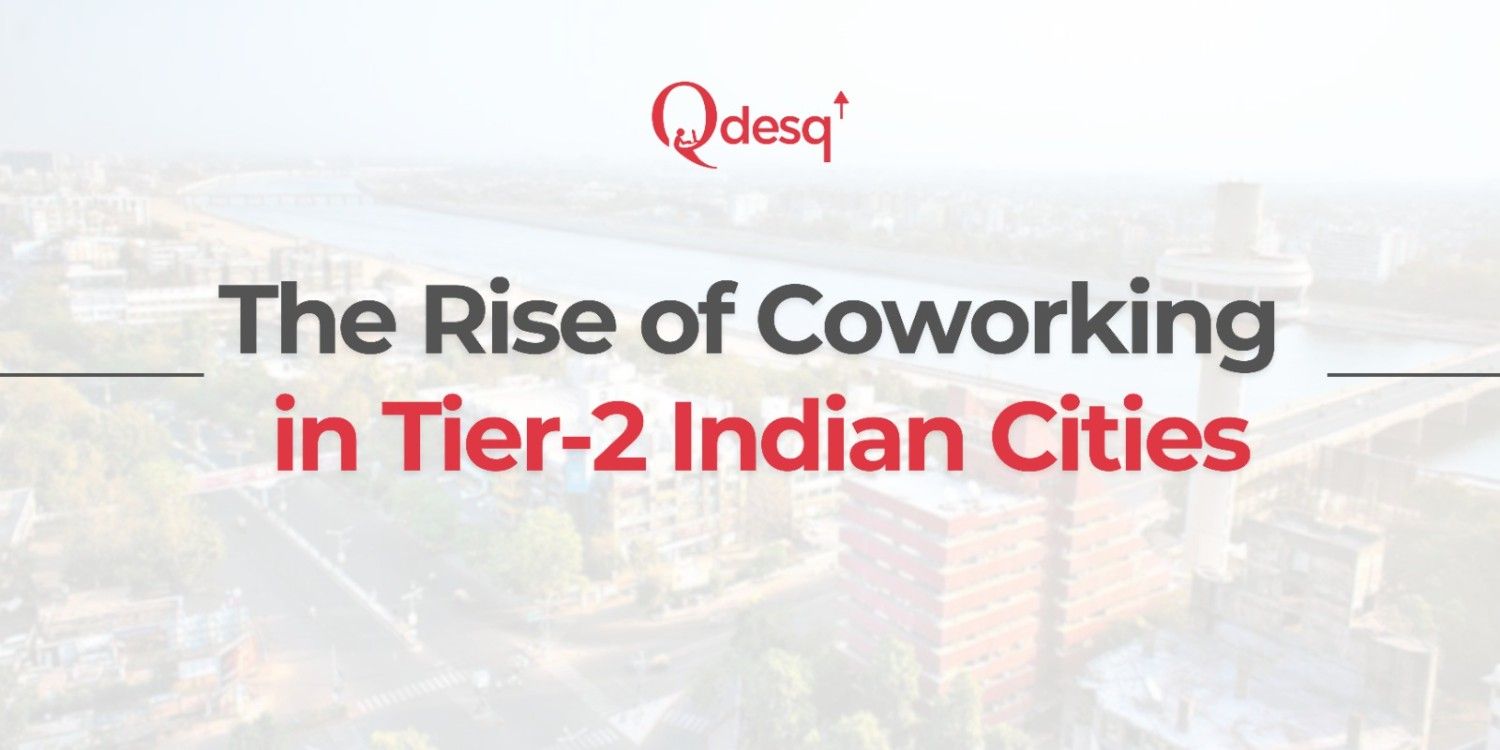Coworking has long been popular in India’s metro cities, but a new trend is quietly reshaping the landscape—the rise of coworking in Tier-2 cities. These smaller but fast-growing cities are now attracting startups, remote teams, freelancers, and even large enterprises looking to set up satellite offices.
With improved infrastructure, lower living costs, and better quality of life, flexible offices or coworking spaces in Tier-2 cities are becoming ideal options. As companies decentralise operations post-pandemic, the flex model is no longer just a metro phenomenon; it’s going mainstream across India’s next wave of urban growth.
Why Tier-2 is on the Rise for Coworking Spaces
Several factors are contributing to the growing appeal of Tier-2 cities regarding coworking. First, there’s cost efficiency. Tier-2 locations offer significantly lower real estate costs for operators and users compared to cities like Bengaluru or Mumbai. This makes it financially feasible for small businesses and startups to operate from quality office environments.
Second, talent retention and recruitment play significant roles. Many professionals prefer working closer to home rather than relocating to expensive metros. With local universities churning out skilled graduates, Tier-2 cities are becoming strong talent hubs.
Third, a cultural shift towards remote and hybrid work encourages companies to distribute their teams across multiple cities. Setting up coworking spaces in these smaller cities helps companies reduce operational overhead while expanding their footprint.
Lastly, government initiatives to develop smart cities and digital infrastructure make Tier-2 locations more attractive for modern businesses. As accessibility and internet connectivity improve, so does the readiness of these cities to host a thriving coworking ecosystem.
Demand Drivers for Coworking in Tier-2 Cities
A mix of practical needs and emerging opportunities is driving the demand for coworking in Tier-2 cities.
One major driver is the rise of startups and entrepreneurs outside the metros. Many founders are now choosing to build their companies in their hometowns, where costs are lower and community support is stronger. For them, coworking spaces offer the perfect balance of professionalism and affordability.
Another factor is the expansion of large enterprises and IT companies into smaller markets. As part of their hybrid work strategies, these firms set up satellite offices or give employees access to coworking passes across cities.
The growing freelancer and gig economy are also major contributors. Designers, writers, consultants, and tech professionals in Tier-2 cities often look for flexible, well-managed workspaces where they can network and collaborate.
Additionally, return migration—where professionals who moved to metros return to their hometowns—adds to the demand. These individuals still want the infrastructure of a modern office without the need to live in a Tier-1 city.
All these factors are coming together to fuel sustained growth in coworking demand across Tier-2 India.
Trends Shaping Tier-2 Coworking Growth
| Trend | Impact on Tier-2 Coworking |
|---|---|
| Shift to Hybrid Work | Drives distributed teams and demand for local flex spaces |
| Affordable Real Estate | Lowers entry barriers for operators and reduces costs for users |
| Infrastructure Development | Smart cities, better transport, and the internet make coworking viable |
| Local Startup Ecosystems | Entrepreneurs seek collaborative, plug-and-play office setups |
| Rise in Digital Talent | Educated youth choosing to stay and work in their hometowns |
| Government Support | Startup India and Digital India initiatives improve business environments |
| Quality of Life Preferences | Professionals value work-life balance and shorter commutes |
These trends indicate a long-term shift where coworking survives and thrives in smaller cities.
What the Future Looks Like
The future of coworking in Tier-2 Indian cities looks incredibly promising. As more companies adopt flexible work models and remote hiring becomes standard, these cities will become key players in India’s professional landscape. We’ll likely see an increase in premium coworking brands entering Tier-2 markets, offering the same quality as metro spaces but at a fraction of the cost. With rising digital infrastructure and growing entrepreneurial ecosystems, coworking spaces in Tier-2 cities are set to become essential hubs for collaboration, innovation, and business growth. The momentum is just beginning—and it’s only going to accelerate.
Top Tier-2 Cities for Coworking Spaces
1. Coworking space in Ahmedabad
Ahmedabad is quickly becoming a startup hotspot thanks to its growing IT sector, strong manufacturing base, and excellent infrastructure. With options for coworking spaces in Ahmedabad across areas like Prahladnagar, SG Highway, and Satellite, businesses are finding cost-effective solutions without compromising on quality. The city’s entrepreneurial spirit and strong support for innovation make it a fertile ground for coworking growth.
2. Coworking space in Indore
Indore has been consistently ranked as one of India’s cleanest cities and is gaining attention for its innovative city initiatives. It’s also a central education hub, attracting a young, skilled workforce. Coworking space in Indore is popular among startups and small businesses seeking professional, affordable growth environments.
3. Coworking space in Chandigarh
Known for its urban planning and lifestyle, Chandigarh is emerging as a top Tier-2 coworking destination. With its proximity to Delhi and a rising startup ecosystem, the coworking spaces in Chandigarh offer businesses the opportunity to work in a well-connected yet peaceful environment. It’s beautiful for IT firms and solopreneurs.
4. Coworking space in Dehradun
Dehradun is no longer just a picturesque getaway—it’s a growing education and tech hub. Coworking spaces in Dehradun are increasingly in demand from remote workers, NGOs, and ed-tech startups. Its scenic surroundings, improving infrastructure, and low cost of living make it a unique choice for flexible office setups.
5. Coworking space in Kochi
Kochi is fast becoming Kerala’s innovation hub, with a growing IT industry and the presence of Infopark. Coworking spaces in Kochi cater to digital professionals, freelancers, and tech startups looking for flexible and well-connected work environments. Its coastal vibe, high-speed internet and infrastructure make it a standout choice.
Final Words
Coworking in Tier-2 cities isn’t just a trend—it’s a shift in how India works. As businesses decentralise and people seek better work-life balance, these cities are stepping into the spotlight. With affordability, talent, and growing infrastructure, they offer the perfect conditions for coworking to thrive. The future of flexible work in India may be led by its Tier-2 cities.











